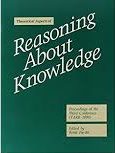TARK
Publication Types:

Epistemic Syllogistic: First Steps
Aristotle’s discussions on modal syllogistic have often been viewed as error-prone and have garnered significant attention in the literature due to historical interests. However, from a contemporary standpoint, they also introduced natural fragments of first-order modal logic, warranting a comprehensive technical analysis. In this paper, drawing inspiration from the natural logic program, we propose and examine several variants of modal syllogistic within the epistemic context, thereby coining the term “epistemic syllogistic.” Specifically, we concentrate on the de re interpretation of epistemic syllogisms containing non-trivial yet natural expressions such as “all things known to be A are also known to be not B.” We explore the epistemic apodeictic syllogistic and its extensions, which accommodate more complex terms. Our main contributions include several axiomatizations of these logics, with completeness proofs that may be of independent interest.

Knowing How to Plan
Various planning-based know-how logics have been proposed and studied in the recent literature. In this paper, we use such a logic to do know-how-based planning via model checking. In particular, we can handle the higher-order epistemic planning involving know-how formulas as the goal, e.g., find a plan to make sure p such that the adversary does not know how to make p false afterward. We give a PTIME-algorithm for the model checking problem over finite epistemic transition systems and axiomatize the logic under the assumption of perfect recall.

In this paper, we propose a lightweight yet powerful dynamic epistemic logic that not only captures the distinction between de dicto and de re knowledge but also the distinction between de dicto and de re updates. The logic is based on the dynamified version of an epistemic language extended with the assignment operator borrowed from dynamic logic, following the work of Wang and Seligman (2018). We obtain complete axiomatizations for the counterparts of public announcement logic and event-model-based DEL based on new reduction axioms taking care of the interactions between dynamics and assignments.

How to Agree without Understanding Each Other: Public Announcement Logic with Boolean Definitions
Abstract. In standard epistemic logic, knowing that p is the same as knowing that p is true, but it does not say anything about understanding p or knowing its meaning. In this paper, we present a conservative extension of Public Announcement Logic (PAL) in which agents have knowledge or belief about both the truth values and the meanings of propositions. We give a complete axiomatization of PAL with Boolean Definitions and discuss various examples. An agent may understand a proposition without knowing its truth value or the other way round. Moreover, multiple agents can agree on something without agreeing on its meaning and vice versa.

A New Modal Framework for Epistemic Logic
Abstract: Recent years witnessed a growing interest in non-standard epistemic logics of knowing whether, knowing how, knowing what, knowing why and so on. The new epistemic modalities introduced in those logics all share, in their semantics, the general schema of ![]() , e.g., knowing how to achieve
, e.g., knowing how to achieve ![]() roughly means that there exists a way such that you know that it is a way to ensure that
roughly means that there exists a way such that you know that it is a way to ensure that ![]() Moreover, the resulting logics are decidable. Inspired by those particular logics, in this work, we propose a very general and powerful framework based on quantifier-free predicate language extended by a new modality x, which packs exactly x together. We show that the resulting language, though much more expressive, shares many good properties of the basic propositional modal logic over arbitrary models, such as finite-tree-model property and van Benthem-like characterization w.r.t. first-order modal logic. We axiomatize the logic over S5 frames with intuitive axioms to capture the interaction between x and know-that operator in an epistemic setting.
Moreover, the resulting logics are decidable. Inspired by those particular logics, in this work, we propose a very general and powerful framework based on quantifier-free predicate language extended by a new modality x, which packs exactly x together. We show that the resulting language, though much more expressive, shares many good properties of the basic propositional modal logic over arbitrary models, such as finite-tree-model property and van Benthem-like characterization w.r.t. first-order modal logic. We axiomatize the logic over S5 frames with intuitive axioms to capture the interaction between x and know-that operator in an epistemic setting.

A Dynamic Epistemic Framework for Conformant Planning
Abstract: In this paper, we introduce a lightweight dynamic epistemic logical framework for automated plan-ning under initial uncertainty. We reduce plan verification and conformant planning to model check-ing problems of our logic. We show that the model checking problem of the iteration-free fragment is PSPACE-complete. By using two non-standard (but equivalent) semantics, we give novel model checking algorithms to the full language and the iteration-free language.

Hidden protocols
When agents know a protocol, this leads them to have expectations about future observations. Agents can update their knowledge by matching their actual observations with the expected ones. They eliminate states where they do not match. In this paper, we study how agents perceive protocols that are not commonly known, and propose a logic to reason about knowledge in such scenarios.
(largely extended journal version of the TARK2011 paper)

Verifying epistemic protocols under common knowledge
Abstract. Epistemic protocols are communication protocols aiming at transfer of knowledge in a controlled way. Typically, the preconditions or goals for protocol actions depend on the knowledge of agents, often in nested form. Informal epistemic protocol descriptions for muddy children, coordinated attack, dining cryptographers, Russian cards, secret key exchange are well known. The contribution of this paper is a formal study of a natural requirement on epistemic protocols, that the contents of the protocol can be assumed to be common knowledge. By formalizing this requirement we can prove that there can be no unbiased deterministic protocol for the Russian cards problem. For purposes of our formal analysis we introduce an epistemic protocol language, and we show that its model checking problem is decidable.
